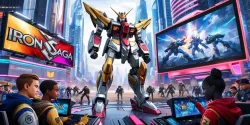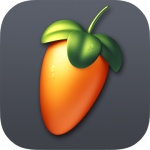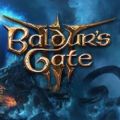be the first to read
The Latest Posts from our blog

- Dark Renaissance: Unearthing the Legacy of the Vampire Universe 5 days ago
The anticipation surrounding this dark, immersive role-playing experience has been palpable for years and now, Devoted followers are keenly anticipating the moment to immerse themselves into a reimagined world. With multiple editions on offer and enticing preorder bonuses, the release aims to capture both long-established supporters and new enthusiasts alike. The rich tapestry of lore, intricate gameplay mechanics, and an expansive open world make this release noteworthy. Every element of the upcoming experience has been carefully designed to blend gothic horror with intricate narrative threads, ensuring that each player finds something that resonates on a personal level. Bold in its ambition, this expansion of the Vampire universe promises depth, nuance, and an opportunity to shape your own nocturnal destiny.
Preorder Offers and Exclusive In-Game Rewards
The preorder strategy for this title is not simply a transaction but rather a gateway into a realm of exclusive content. By preordering any In this updated release, players are granted entry to the Bloodlines Nostalgia Jukebox. This delightful bonus unlocks an array of original compositions that pay homage to the legacy of the first installment. The rich musical pieces, composed by acclaimed talent, serve to entwine the present with the echoes of the past, offering a harmonious blend that reinforces the series' storied history. The inclusion of such curated content ensures that each moment of gameplay is underpinned by a stirring soundtrack—a thoughtful extra that deepens immersion and elevates the overall experience for those who have long awaited the return to this shadowy narrative universe.
Diverse Editions for Every Enthusiast
Fans have been presented with multiple editions, each carefully crafted to suit different levels of commitment and collectible desires. The standard edition, offered as a physical copy for consoles and digital across various platforms, comes as a solid entry into the high-octane, narrative-driven game. Meanwhile, the Deluxe Edition builds on this offering by integrating additional in-game content that includes decorative elements to personalize the virtual spaces. For those who seek a more comprehensive package, the Premium Edition includes an Expansion Pass that will allow early access to future narrative expansions. Each of these editions is designed to cater to distinct gaming preferences, ensuring that whether your interest lies in pure gameplay or collecting exclusive digital assets, there is an option crafted to enhance your engagement with the evolving Vampire universe.
Gameplay Mechanics and Immersive Combat
The gameplay mechanics in this title promise a fluid and engaging mixture of strategic combat and intricate narrative decision-making. Players step into the role of a seasoned elder vampire navigating a complex web of political alliances and dangerous confrontations. The combat system encourages a balance between brute physical prowess and the subtle use of supernatural abilities, offering a range of approaches—from direct confrontations to skillful negotiation. The narrative is interspersed with elements of tension and conflict, providing opportunities to explore vast urban backdrops and treacherous underworlds. With the option to both fight and manipulate interactions using your wits, the game challenges players to consider every choice and every alliance carefully, creating a game experience that is as intellectually demanding as it is visually striking.
Gothic Atmosphere and Intricate World-Building
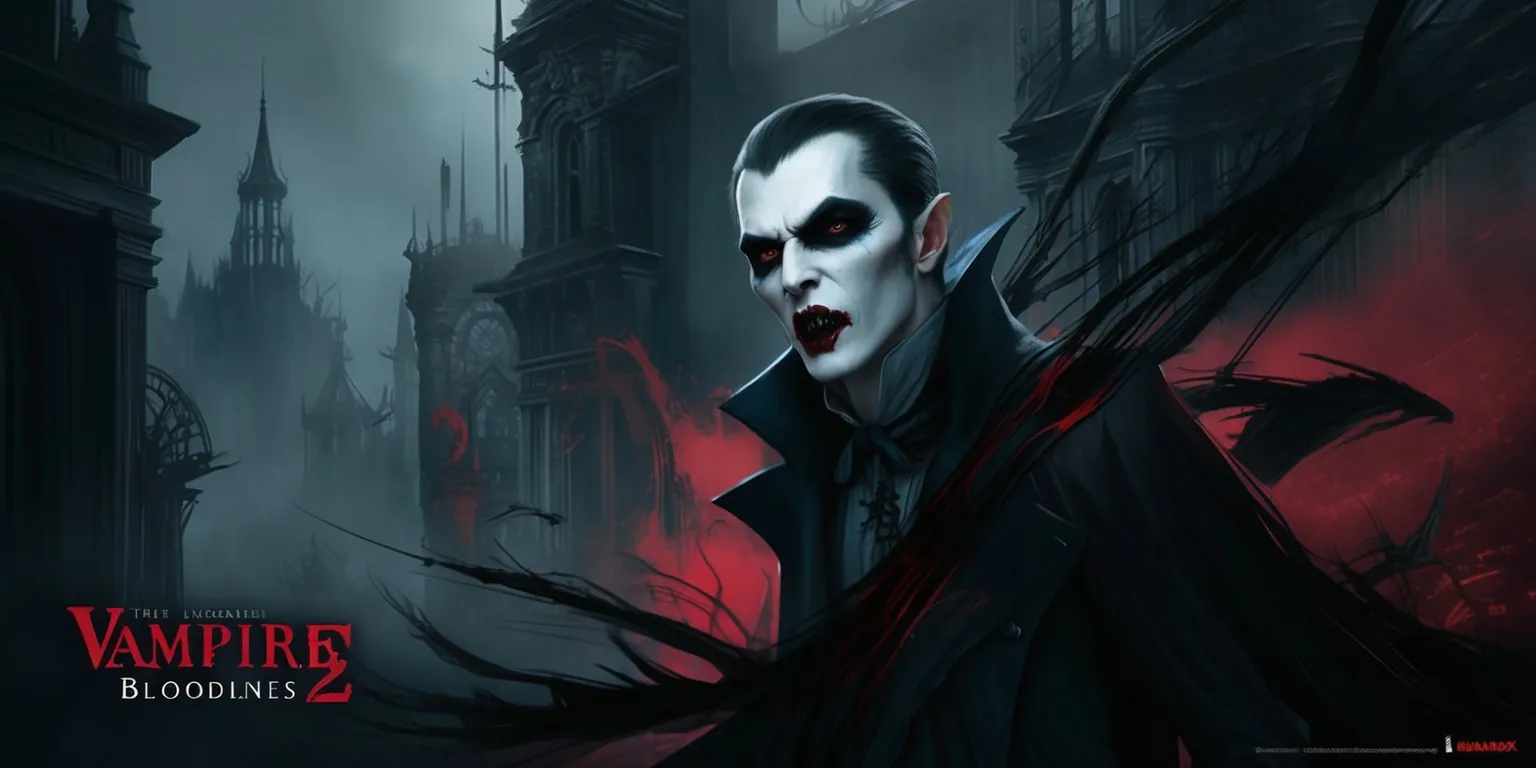
Set against the haunting backdrop of Seattle, the game crafts an immersive environment where every shadow holds secrets and every corner reveals new layers of danger. The atmospheric design is meticulously rendered to evoke feelings of both decay and allure—a perfect stage for a narrative where ancient vampires wrestle with modern dilemmas. Rich architectural details interlace with urban grit, creating a visual narrative that effortlessly blends retro charm with state-of-the-art innovation. As you traverse this cityscape, the lore of various clans and factions unfolds, highlighting the constant tension between power and survival. This A keen focus on the intricacies of environmental design not only underscores the game’s dark thematic core but also beckons gamers to immerse themselves in a realm where stunning beauty is inextricably linked with lurking dangers.
Deluxe Edition and Expanded In-Game Personalization
The Deluxe Edition of the game offers more than just the standard storyline; it invites gamers to delve into a richer digital tapestry. This version comes bundled with the Santa Monica Memories DLC pack, which introduces additional decorative content that can be integrated into your in-game sanctuary. Items such as the Ankaran Sarcophagus and the Neon Clan sign give players the opportunity to customize their virtual space, reflecting personal tastes and in-game achievements. These detailed extras are not merely cosmetic; they are intricately tied to the game’s narrative and offer a fresh perspective on the character’s journey. Through this blend of functional enhancements and artistic flare, the Deluxe Edition provides a layered experience, enabling players to craft a unique environment that visually echoes the rich backstory of their character’s dark legacy.
Premium Edition and Future Narrative Expansions
For the dedicated enthusiast looking to invest fully in the evolving narrative of this dark saga, the Premium Edition stands as the pinnacle of access and content. This variant not only includes every aspect of the Deluxe Edition but further adds an exclusive Expansion Pass that promises to unlock forthcoming narrative packs. These future expansions, slated for release in the coming years, will delve deeper into the lore, unpacking stories that have has long been implied without ever being thoroughly investigated. With the inclusion of these DLC packs, the Premium Edition blurs the line between a single game and an ever-expanding universe, ensuring longevity and continuous engagement. This approach cements the title not merely as a standalone release but as an ongoing saga that will grow and evolve, reflecting the dynamic storytelling traditions that have long defined the Vampire series.
Integration of Nostalgia with Modern Technology
A fascinating A remarkable quality of the game is its ability to… weave nostalgia seamlessly into its technologically advanced framework. The reintroduction of classic musical elements from the original Bloodlines soundtrack serves as a bridge between past and present. In reimagining these beloved compositions, the game leverages modern sound design and cutting-edge technology, providing an auditory an encounter that blends the comforting charm of the familiar with the invigorating allure of the new commitment to preserving the series’ heritage while integrating innovative gameplay elements highlights the thoughtful design philosophy behind the release. It's a celebration of the series’ legacy—one that respects its origins even as it forges new artistic pathways in narrative and audiovisual presentation. This delicate balance of old and new offers an enriched experience, deepening player engagement through layers of cultural and auditory reminiscence.
Detailed Craftsmanship and World Aesthetics
The visual and aesthetic design of this game serves as clear evidence of the painstaking attention to detail that has influenced every facet of its creation. From the meticulously modeled urban landscapes to the stark contrasts in lighting that evoke a feeling of perpetual twilight, the aesthetic vision is robust and compelling. The character designs themselves embody a mix of elegance and menace, forming an intricate part of the storytelling process. Every element, from the draped textures of ancient garb to the sleek, modern interfaces of the urban environment, is harmoniously designed to evoke the duality of beauty and decay in the vampire mythos. This careful attention to visual narrative ensures that every in-game moment is not just a part of the overarching plot, but stands as a small, artfully realized vignette within a larger, mesmerizing tableau.
Expanding the Narrative Through Companion Literature
Complementing the digital experience, a beautifully rendered hardcover companion book is set for release that further expands on the game’s narrative and artistic conception. This expansive volume, spanning over 200 pages, provides a comprehensive analysis of the game’s development process, conceptual art, and the underlying vision that guides its sprawling narrative. It provides fans with behind-the-scenes insights and detailed artistic depictions that embody the core spirit of the series’ creative spirit. This companion piece transforms the gaming experience into a multidimensional journey that extends beyond the screen, allowing enthusiasts to physically engage with Consider using: "the franchise's storied mythology and signature artistic expression. The" craftsmanship of this art book mirrors the intricate detailing seen throughout the game, offering an elaborate collection of visuals and commentary that enriches the overall cultural experience associated with this dark, immersive world.
Developer Insights and the Broader Vampire Universe
The narrative richness in the game is further amplified by the insights provided by its developers. Through various communications and bonus content, players are granted a glimpse into the creative challenges and inspirations that shaped this ambitious project. This behind-the-scenes look helps to underscore the thought and innovation driving the game’s evolution. A comprehensive vision is presented where modern gameplay mechanics are intricately interwoven with the deep, layered history of the Vampire universe. It becomes clear that every decision, from in-game mechanics to the narrative structure, is part of a larger tapestry of lore that spans decades. This dynamic interplay between creative intent and player agency solidifies the title as a forward-thinking reinterpretation of a beloved series, ensuring that each gaming session is Both an homage to bygone eras and an embodiment of modern innovation can be seen here exploration of new storytelling horizons.
Retail Collaborations and Special Launch Strategies
The distribution strategy for the game involves collaboration with major retail partners and digital storefronts, ensuring wide access across multiple platforms. Physical copies at select chains provide a tangible connection to the game, while digital preorders across platforms offer the convenience and immediacy demanded by modern gamers. Each platform has its tailored version, ensuring that no matter the medium—whether a console or PC—players receive a quality experience enriched with unique in-game bonuses. These retail partnerships also tie into the overall strategy of integrating in-game rewards with cross-promotional merchandise. The careful coordination Incorporating both digital platforms and physical retail locations reflects an understanding of today’s diverse consumer landscape, ensuring that the game achieves both broad reach and deep market penetration while offering dedicated fans the various ways to engage with the content.
![img]()
- Full Throttle Through the Cosmos: A Premium Space Racing Adventure 5 days ago
This fresh take on a space racing adventure has generated an increasing sense of excitement with every update. The concept of competing amid the iconic galaxy sparks intrigue, and with hints of high-speed challenges and out-of-this-world events, fans are eager to explore every nuance when the game launches.
Early news had already established that this new racing experience set in a famed galaxy would incorporate thrilling jet-powered races. Over time, additional details have been revealed: the game will include high-energy race sequences reminiscent of classic podracing, immersive gameplay moments, and a structure that promises an all-inclusive experience from launch.
Recently, while conversing with a renowned figure, gaming publication, the head of Fuse Games, who also holds the chief executive position, It was clearly communicated that the game was thoughtfully conceived as a complete product. The intention is to offer both the campaign, an arcade mode, and a multiplayer component all in one go. The approach focuses on delivering an exceptional, premium experience without the need for recurring purchases:
- A dedicated campaign mode
- A fun arcade mode
- Engaging multiplayer action
- An overall self-contained game
The idea of a standalone racing game, free from continuous financial requests, seems increasingly rare in today's market. The developer emphasized that their vision for this project is much like that of a premium title—one that does not Depend on a model built around no-cost entry, where additional spending is common. While there is a possibility that future downloadable content could emerge, any such enhancements are more likely to take the form of larger expansions rather than incremental seasonal updates.
With many team members having their roots in the renowned studio responsible for legendary racing games, this project is seen as a return to form. The collective goal is to create a game that is solid and complete right out of the box, echoing the philosophy that defined earlier successes and promising a thoroughly satisfying experience from start to finish.
![img]()
- Divine Intrigues: New Gods Elevate the Legendary Quest 5 days ago
This upcoming season of the series brings a fresh twist to the narrative by introducing three divine characters whose roles promise to either guide or challenge the main hero on a new adventure. The production remains active, and the excitement around these additions is building as filming is expected to conclude around early March.
The third season of the myth-based series is already in production, with the crew working diligently to wrap up shooting in the near future. Alongside familiar faces, three new guest performers have been confirmed to join the cast, each embodying a key deity whose influence will shape the unfolding story.
Based on industry reports, notable actors Ming-Na Wen, alongside Jennifer Beals and Hubert Smielecki, have been cast as gods, contributing a fresh dynamic to the series. Their portrayals will not be regular, but rather special appearances intended to enrich spectral family affairs from Greek lore.
- One actor portrays the queen of the gods, the consort of Zeus, who commands respect on Olympus while uniquely wielding authority through her distinguished offspring on the council.
- Another takes on the role of the goddess of agriculture and seasonal cycles, a relative of Zeus who has not forgotten the struggles of ancient conflicts and is determined to secure the realm from recurring dangers.
- The third new addition embodies the radiant god associated with the sun, music, poetry, archery, and prophecy—a figure celebrated for brilliance and charm, whose presence "is bound to make an indelible impression on" the ongoing saga.
Enthusiasts of the original literary works can anticipate how these three divine figures will influence the events of the new season. As the intricate dynamics among the gods continue to evolve, viewers will soon discover the twists and turns awaiting Percy on his latest quest.
![img]()
- Unleashing Mecha Legends: The Iron Saga Experience of Combat, Customization, and Community 2 weeks ago
The realm of Iron Saga opens up a universe where colossal battle machines and intricate role-playing elements combine to form an experience steeped in futuristic lore and engaging strategy. Within this unique game world, players embark on adventures steeped in mystery, vibrant combat, and endless customization possibilities. Enthusiasts of mecha and RPG genres can immerse themselves in a setting where ancient wars and advanced technology collide, offering a multifaceted journey that draws players into a dynamic narrative. Every decision and battle is woven into the ongoing saga of technological relics and ambitious pilots, inviting gamers to explore both the depths of their custom creations and the vast narrative threads left by a forgotten past.
Exploring the Legacy of a Forgotten War
In Iron Saga, the backdrop of a long-ago conflict shapes a world where memories have dimmed and legends linger. The narrative traces back to a time when twelve formidable battle machines almost upended the balance of human civilization. As the echoes of that ancient struggle fade into myth, new threats surface with a desire to reclaim lost technology, setting the stage for modern pilots to engage in epic battles. This historical tapestry enriches the gameplay by blending elements of mystery and legacy into every encounter and mission. The game ingeniously leverages its lore to create a setting where past conflicts inform present challenges, and every combat encounter feels like a step toward unraveling the intricate story of survival and rediscovery.
Crafting the Ultimate Mecha Setup
The core appeal of Iron Saga lies in its highly detailed personalization engine that empowers players to design a unique battle machine from a staggering array of parts. With over 150 different characters and more than 100,000 potential combinations, every mech can be tailored to suit a player’s strategic preferences. This inventive feature encourages experimentation, pushing players to mix and match components to optimize offensive and defensive capabilities. The flair for personalization extends not only to combat efficiency but also to aesthetic design, ensuring that each creation reflects the individuality of its pilot. Such a flexible system demands both creativity and tactical insight, rewarding those who invest time in crafting a mech that can adapt to the evolving challenges posed by the game’s diverse missions and adversaries.
Dynamic Combat and Tactical Engagement
Every battle in Iron Saga is a carefully orchestrated dance of strategy and split-second decision-making. The combat system is engineered to offer a variety of modes, ranging from structured story-driven missions to more spontaneous arena encounters where players test their mecha against one another. In these multifaceted battles, pilots must rely on both the inherent strengths of their custom builds and their proficiency in maneuvering through different combat scenarios. The game emphasizes real-time strategy, Urging players to react swiftly and rely on agile thinking and leverage environmental advantages during clashes. This engaging combat mechanic transforms every encounter into an electrifying display of tactical prowess, where understanding the intricacies of your setup and the dynamics of the battlefield proves critical to achieving victory.
Interacting in a Vibrant Multiplayer Community
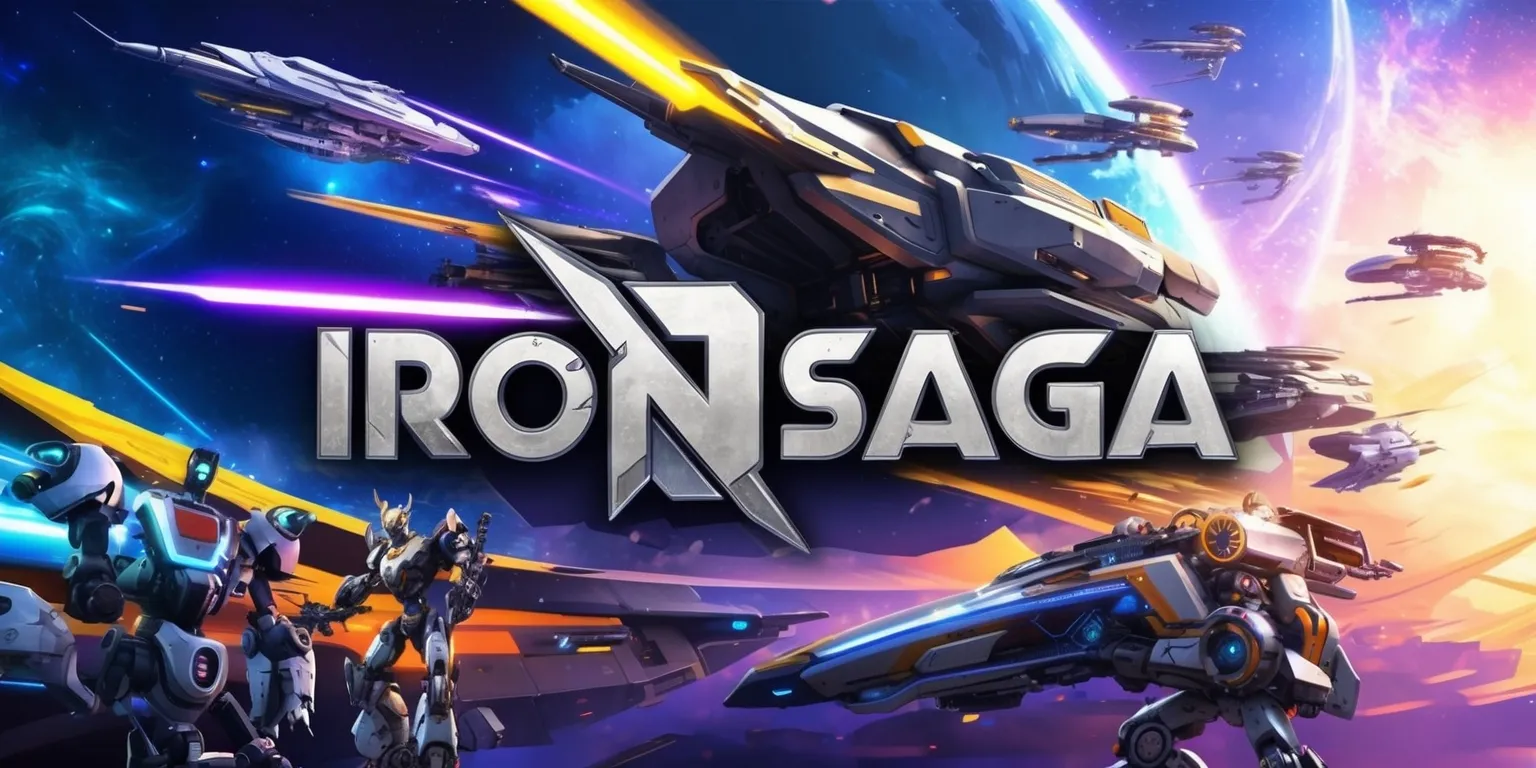
Beyond the immersive single-player narrative, Iron Saga thrives on its robust multiplayer platforms that foster a lively community of mech enthusiasts. Players are invited to engage in various modes such as arena showdowns, simulation challenges, and even competitive races that test both speed and strategic acumen. Daily Dynamic interactions paired with enticing rewards infuse the experience with heightened excitement, inspiring players to… log in and exchange experiences with friends and rivals alike. The social aspect of the game is well-integrated, providing opportunities for collaboration and friendly competition. Whether it is through direct combat on digital battlegrounds or through spirited discussions in community hubs, the multiplayer component of Iron Saga reinforces the sense of connection and shared adventure that defines this ever-evolving universe.
Redeeming Digital Rewards and Bonuses
One key feature that enriches the Iron Saga experience is the integration of digital codes, which provide players with valuable in-game currency to enhance their journey. These promotional codes, often shared through the game’s social channels, yield impressive rewards such as an influx of Diamonds that serve as a premium currency for further advancements. The redemption process is streamlined, inviting gamers to simply access the system menu via a gear icon, input their unique code, and retrieve their bonus. This mechanism not only incentivizes regular gameplay by offering refreshing boosts but also nurtures a sense of continuity and reward for devoted players. The digital bonus system seamlessly blends with the overall design, ensuring that every expedition is further enriched with tangible perks.
Streamlined Navigation Through the Code Portal
The method for accessing reward codes in Iron Saga is elegantly straightforward, designed to minimize disruption and maximize benefit for the user. Upon launching the game, players are invited to tap the system button – represented by a gear icon – before proceeding to a dedicated code entry interface. This user-friendly setup leads to a clear step-by-step process in which codes are submitted and verified. Once the input is validated, another icon resembling a gift appears, allowing users to claim their earned benefits without hassle. The design ethos here is one of simplicity fused with functionality, ensuring that players can quickly reinvest their rewards into enhancing their mecha and overall gameplay experience. This thoughtful integration of bonus redemption emphasizes both ease of access and the rewarding spirit of Iron Saga.
Emphasis on Timely Engagement and Reward Retrieval
In Iron Saga, the allure of special rewards is carefully balanced with a requirement for timely engagement. Once a promotional code is redeemed, players Here are a few options: • …are made aware that they only have a short timeframe. • …are notified that their opportunity is time-sensitive. • …are alerted to a narrow window of opportunity. • …are informed that they must act within a brief period. Choose the option that best fits your sentence’s context of seven days to claim the bonuses. This clever design decision introduces an element of urgency and commitment, encouraging regular interaction with the game. The countdown timer for code redemption not only heightens anticipation but also helps maintain a vibrant, continuously active player base. Within this system, every login is more than just a continuation of the game—it is an opportunity to snatch limited-time rewards that can significantly influence the progress and customization of one’s mecha. Such time-sensitive offers preserve excitement and instill a proactive approach to the digital rewards system central to Iron Saga’s gameplay philosophy.
Vivid Aesthetics and User Interface Design
Iron Saga captivates players not only with its strategic depth but also with its striking visual and interface design. The world is rendered in a sophisticated blend of futuristic and retro aesthetics that balance modern visual effects with classic design elements. Each mecha is meticulously detailed, and the in-game environments resonate with an atmospheric quality that feels both gritty and ethereal. The interface, featuring intuitive icons and easily navigable menus, demonstrates a commitment to ensuring that players are never overwhelmed by complexity. Instead, it provides clear visual cues and feedback that guide users through gesture-based commands and immersive story panels. This harmonious convergence of art and functionality makes the game accessible while remaining engaging Catering to both seasoned players and gaming newcomers alike mecha genre.
Social Connectivity and the Broader Game Network
Recognizing the importance of community in modern gaming, Iron Saga integrates various social features designed to promote real-time connectivity among players. Through links to platforms such as X, Facebook, and Discord, players can share tips, discover hidden rewards, and stay updated on the latest code releases. This network of social channels ensures that every player remains well-informed about community events, bonus challenges, and significant updates that expand the game’s universe. The social interactivity provided by these platforms enhances the overall experience by turning gameplay into a communal adventure, where strategies are exchanged, alliances are formed, and every session becomes a part of a larger narrative shared by a dedicated global community. These elements collectively underscore the game’s commitment to fostering vibrant, enduring engagements.
Integration of Promotional Ecosystems and Cross-Game Rewards
The rewarding ecosystem in Iron Saga is part of a larger network of promotional activities that span across various gaming platforms. Players who enjoy the thrill of receiving supplementary bonuses can often discover that these codes serve as a gateway to additional perks not just within Iron Saga but also in affiliated titles. This creates an expansive reward system where codes linked to one game might lead to exclusive items in another, inviting players to explore multiple avenues of digital engagement. From unlocking premium currency to accessing rare customization options and bonus content, the interconnected nature of these rewards Infuses the experience with an extra dimension of nuance. In this way, Iron Saga’s approach to digital promotions ensures that both dedicated veterans and newcomers can uncover hidden treasures throughout their journey and across related gaming communities.
Continuing the Saga Through Regular Updates and Code Releases
The narrative of Iron Saga is continuously enriched by periodic updates that introduce fresh content, new code releases, and innovative game modes. Each cycle of updates not only expands the labyrinthine story of mech warfare but also provides tangible benefits to players through regular drops of promotional codes. These forthcoming changes have sparked considerable excitement among community members, as they often bring along new challenges, gameplay mechanics, and visual enhancements that reinvigorate the overall experience. The commitment to regular content refreshes ensures that every return to the game feels like the discovery of a new chapter. With continuous integration of disruptive yet thoughtful progressions, Iron Saga manages to keep its narrative and interactive layers deeply engaging, sustaining both player enthusiasm and competitive vigor.
![img]()
Game Reviews
Id posuere maecenas pulvinar elit. Faucibus neque non blandit pellentesque et massa amet.
 Age of Wonders 4 View full review
Age of Wonders 4 View full review Hear from our users












